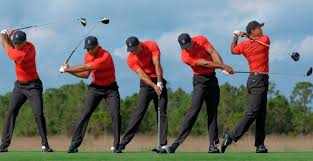At the risk of a bad pun, you are the driver of the golf ball. If your mechanism for movement—in our metaphor, the steering—is compromised, your golf shots will be compromised, too. The Alexander Technique helps you identify and reliably change swing faults that run your ball off the road.
The Alexander Technique has three skills: awareness, inhibition, and direction.
Awareness is a life skill for anything you do. Golf requires awareness skills for processing a broad spectrum of experiences that include proprioception, kinesthesia, emotions, balance and the application of effortless power. Awareness in golf, of which feel is a part, is not innate; it has to be learned. Feel, the current Holy Grail of golf, is notoriously inaccurate, but still a vital part of the learning process. Once the useful experiences of feel are mastered, they must be relegated to the unconscious brain. Processing feel with the conscious brain during the swing is too slow and disrupts timing, sequence, and rhythm.
Inhibition is the next and most important of the three skills. Alexander observed, by using mirrors, what he was doing wrong—just as golfers use videos today. To his surprise, he couldn’t change his habit simply by doing something else. As soon as he forgot what he was doing to change the habit, the original habit would return. The same thing happens to most golfers who try to change a bad habit by using a quick fix. A quick fix is like spray-painting over rust.
Alexander discovered that the unconscious brain was faster than the conscious brain, and he needed another way to inhibit the force of his habit. He had already observed that his habit was triggered by a thought. For golfers preparing to swing, that thought is some variation on “hit the ball.” Alexander found a way to inhibit his habit not by “doing” something different with his body, but by thinking a different thought.
Inhibition changes everything.
That different thought for golfers as they take address position is, “I’m not going to hit the ball.”
After the strangeness of this idea begins to fade, consider what is being proposed. Most amateur golfers have a powerful and often maladaptive reaction to “hit the ball.” If the golfers have been playing for any length of time, the habit connected to hit the ball has been well practiced and feels normal even though the outcome of the swing is often bad. Usually the golfers have tried a quick fix or swing key that seems to make sense, but the results are decidedly mediocre.
With practice, use of the skills of inhibition to stop the maladaptive parts of a golf habit brings the presence of the ideal performance state.
The ideal performance state is then maintained by a series of instructions or directions, the third skill in the Alexander Technique. Alexander thought carefully about how to easily and concisely communicate the conditions for the ideal performance state. His directions are: “Allow the neck to be free, so that the head can balance forward and up in relation to the neck, so that the back can lengthen and widen.”
These conditions are a thumbnail sketch of how the Alexander Technique can make you a better driver of the golf ball. There is no better teacher than direct experience. You can attempt to do what Alexander did to reliably change his habits—it took him nine years—or you can work with a teacher who can facilitate direct experiences in the brain/ body that will surprise or even shock you.
The only thing you have to lose is your bad swing habits.
-Edward Bilanchone



Comments are closed